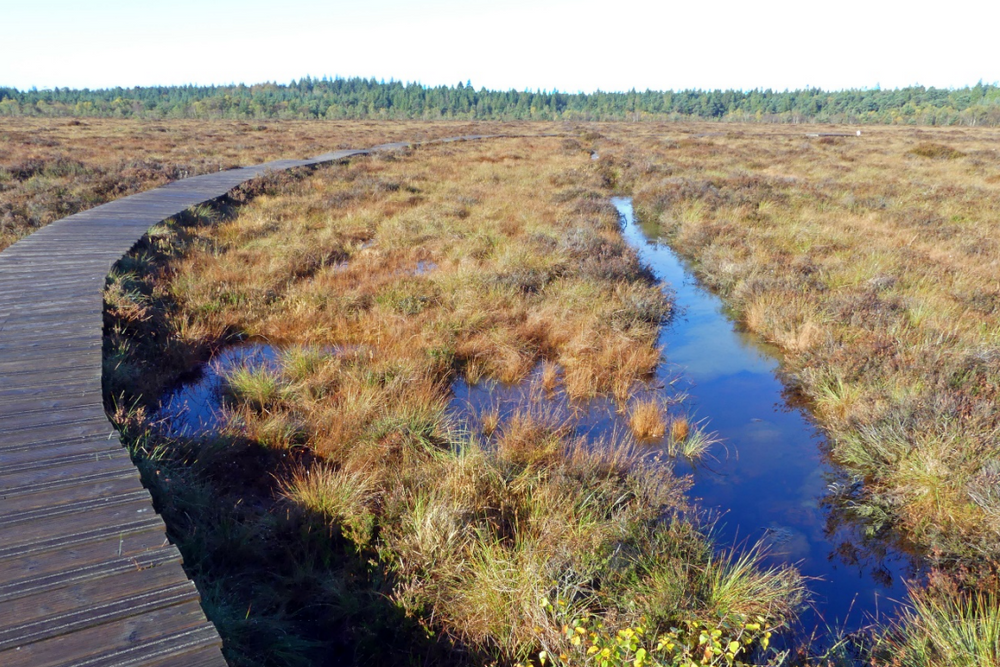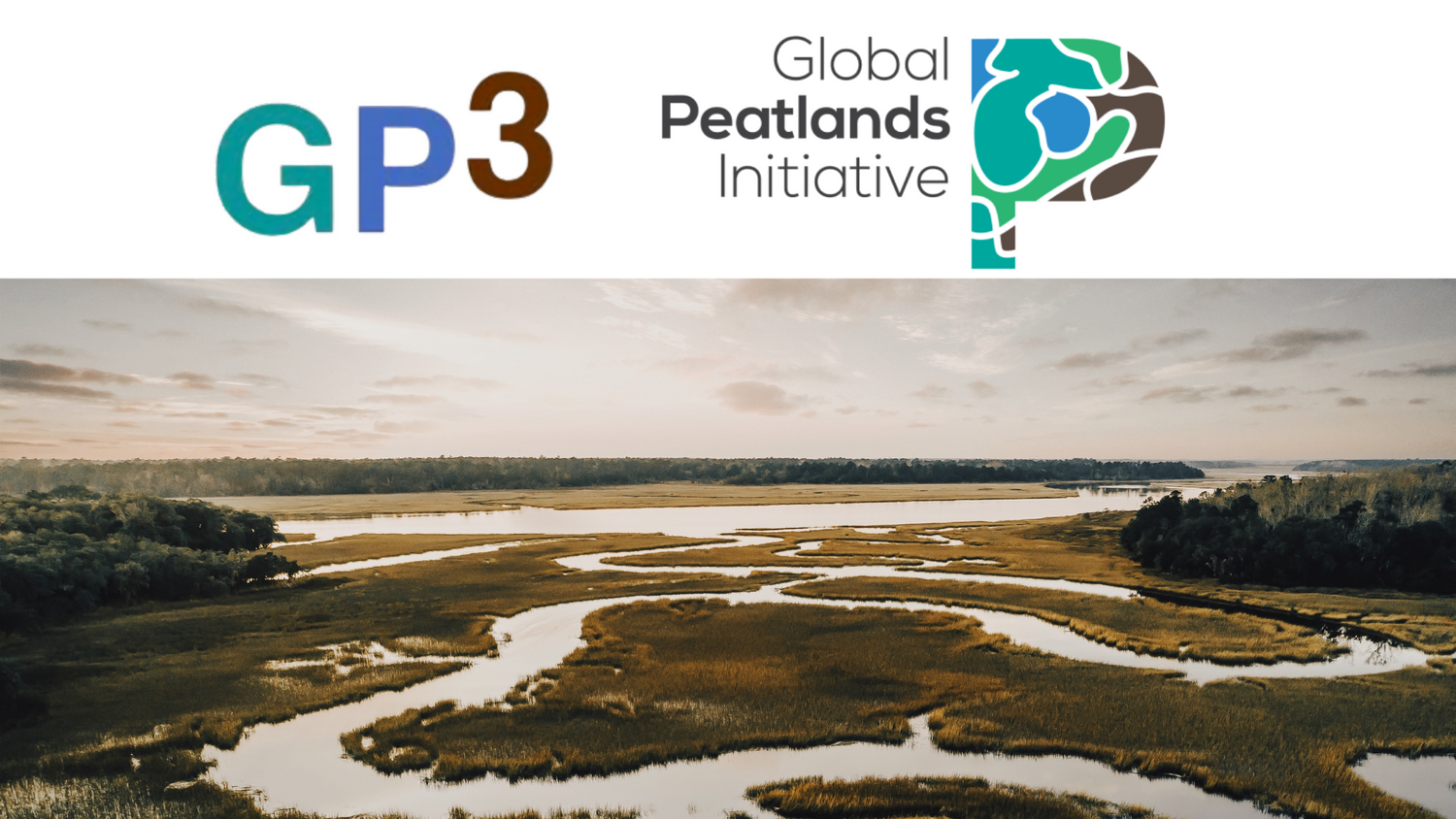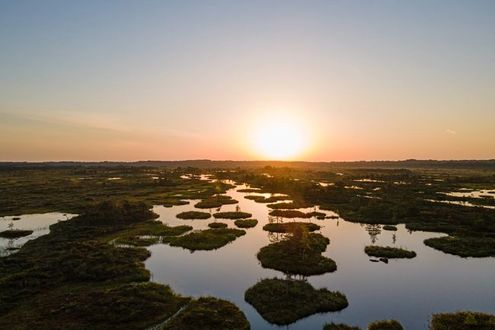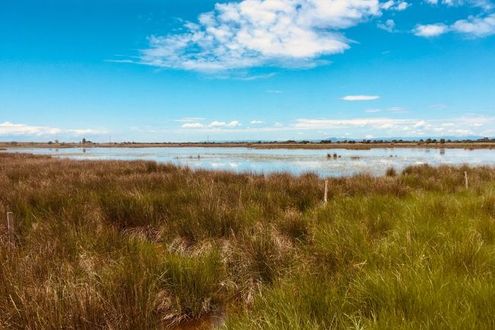An ambitious new Horizon 2020 EU Green Deal-funded project is now officially up and running, following its first in-person meeting of all 32 partner organisations in Dublin last week, who brought their knowledge, experience and expectations from 14 different European countries to upscale the restoration of wetlands including peatlands across Europe.
The importance of wetlands, including peatlands, is increasingly being acknowledged – not only in academic spheres, but even among the upper echelons of government and corporate structures. From historically marginalised lands, these areas are now seen to provide essential ecosystem services, including key nature-based solutions (NbS) to slow the progress of climate change and mitigate against its most harmful effects. In addition, communities living near wetlands across Europe are being increasingly drawn to engage in their protection and restoration thanks to a growing recognition of their cultural, amenity and spiritual value. Finally, the wise use of wetlands through paludiculture – growing water-tolerant crops on wet peatlands rather than draining them – gives added value to their continued existence, if managed sustainably and incentivised in the right way.
The WaterLANDS (Water-based Solutions for Carbon Storage, People and Wilderness) project aims to upscale the restoration of wetlands including peatlands across Europe, by co-creating a new paradigm of restoration best-practice, equally integrating the four key pillars of ecology, community, governance and finance.
Having been awarded over €23 million in direct funding through the European Union’s Green Deal Call, this project will initially aim to restore upwards of 10,000 hectares of wetlands across 6 Action Sites, utilising the experience garnered from 15 Knowledge Sites across Europe. Coordinated by University College Dublin, the project will then incubate replication of restoration in other similar locations, scaling up restoration beyond the geography and timeline of this 5-year project.
At the first in-person meeting of partners this week, Deputy WaterLANDS Coordinator Dr. Shane Mc Guinness said: “Until now, wetland restoration has been small-scale, project-based and with defined time limits to funding. It thus requires significant upscaling and consideration of how a legacy can be established through economic incentivisation and community support”.
Importantly, this project is classed as an Innovation Action and includes representation of not only academia, but also community organisations, local governments, environmental non-governmental organisations and commercial entities, ensuring that all important stakeholders of restoration are not simply engaged with intermittently but are included from the beginning and have a formalised stake in how restoration progresses. Furthermore, over 60% of our budget is dedicated directly to restoration.
Dianna Kopansky, Global Peatlands Coordinator at UNEP, commented: “A shocking 50% of the EU’s peatlands are degraded, more than twice the world average. The WaterLANDS project addresses several important gaps in reducing this figure, in line with the UN Decade on Ecosystem Restoration: building a long-term, scaled-up vision for peatland restoration in Europe, and building that vision inclusively with all stakeholders. I look forward helping ensure that the impacts of WaterLANDS are scalable and long-lived!”
Restoration will occur at three peatlands [Cuilcagh-Anieran (Ireland), Yorkshire iCASP (England), Parnu catchment (Estonia)], two coastal wetlands [Ems-Dollard (Netherlands), Venice lagoon (Italy)] and an inland karst marsh of international importance [Dragoman Marsh (Bulgaria)]. Restoration works will vary from site to site, with some interventions involving active restoration of wetlands, some incentivising land-users to modify existing harmful practices, and others focussing on developing robust governance and finance structures based on the provision of tangible ecosystem service benefits. The biodiversity value of all 6 Action Sites is high; from Estonia where there are still brown bears and wolves to be found in nearby forests, the short-toed eagles of Dragoman in Bulgaria, and the importance of coastal wetlands in Venice and Ems-Dollard for myriad wader species. The blanket bogs of the Great North Bog in England and Cuilcagh-Anieran in Ireland are also important for curlew, red grouse and hen harrier. Of course, suitably diverse plant communities support these animals, while also sequestering carbon and storing water.
WaterLANDS revolves around a simplified workflow of existing Knowledge, leading to Action at sites, which incubates a Legacy of restoration that continues beyond the 5-year project. This begins with the diverse experience held by 15 Knowledge Sites across Europe. Some are large and well-known locations, such as Donana in Spain and the Camargue in France, while others are smaller but no less valuable. They demonstrate wetlands in various stages of restoration, but also provide us with information on various types of management, governance and public engagement, including diverse stakeholder types, agricultural pressures, ownership and community management linked to the special types of ecosystems. We hope to learn from these sites on successful approaches and pitfalls to avoid.
The project will also involve innovative ways of engaging communities, notably enlisting the assistance of artists-in-residence at each Action Site, ensuring that scientists broaden their ‘way of seeing’, while also better communicating the values of our network of wetlands in ways which resonate with local communities. According to Dr. Craig Bullock, Project Coordinator, “WaterLANDS places a strong emphasis on co-creation through the engagement of a range of expertise, scientific and practical, but also from communities. It's essential that we recognise the multiple means with which people engage with wetlands, and that we also use multiple means to get engagement with restoration”.

Photo: Abbeyleix Bog, Ireland (Chris Uys)
Dianna Kopansky added: “The restoration of peatlands across Europe will vastly reduce the region’s greenhouse gas emissions and help countries meet their climate pledges, ahead of emissions reporting from wetlands in Europe becoming mandatory from 2026. These restoration efforts will also support declining and endangered populations of wetland-dwelling species, such as the aquatic warbler, Europe’s only passerine songbird, the curlew, unique carnivorous plants and invertebrates like dragonflies – many on the IUCN Red List of Endangered Species due to the destruction of their peatland habitats.”
Identifying continued funding beyond project lifespans has remained a critical limitation of similar projects. Thus, a core aim of WaterLANDS will be to develop investible propositions for some of our restoration sites which attract continuing blended finance. To strengthen investor confidence, this will adopt a landscape finance approach embedded in national policy and standards.
The past two years of this process, from project development, application and technical commencement in December 2021, have been entirely remote. Meeting in person and reinforcing our collective bond is key to effective collaboration and the ultimate success of the project. Meeting in person is also a lot more fun than three days of Zoom!
To join our mailing list, keep up with our progress and learn more about the WaterLANDS Knowledge and Action Sites, check out our website at the following link: https://www.waterlands.eu/
This release is part of the Global Peat Press Project (GP3) campaign, bringing together international partners to highlight the importance of peatlands as vulnerable but valuable ecosystems. It is a coordinated media outreach from the UNEP’s Global Peatlands Initiative (GPI) and the North Pennines AONB Partnership to promote the UN Decade on Ecosystem Restoration (2021-2030). It was conceived to raise awareness and enthusiasm about the role of peatlands in climate action in the run-up to the UNFCCC COP26 in November, and has now pivoted to focus on the vital importance of peatlands for nature, aiming to build momentum and interest in advance of the Convention on Biological Diversity (CBD) COP15 in April next year. A relay of stories from peatland projects worldwide, GP3 started with the UK, as the host of COP26, which took place in Glasgow, Scotland. The relay has already featured: - the North Pennines AONB - the Care-Peat project in Belgium - NUI Galway/ Insight Centre - Five EU transnational projects (Carbon Connects, Care-Peat, DESIRE, LIFE Peat Restore, and - CANAPE) - Bax & Company who straddle the UK, Spain and The Netherlands - Ulster Wildlife - The Lancashire Wildlife Trust - The GPI and EUROSITE Peatlands Social Media Campaign - NABU - Moors for the Future Partnership - Metsähallitus with its Hydrology LIFE Project - Natural Resources Wales with the LIFE Welsh Raised Bogs Project - Community Wetlands Forum and the Landscape Finance Lab - Terra Motion - Green Restoration Ireland Coop (GRI) - a major restoration effort in Belarus recognized by the Ministry of Natural Resources and - Environmental Protection of the Republic of Belarus - a second release from Ulster Wildlife - The World Conservation Monitoring Centre (WCMC) at the UN - Griefswald Mire Centre in Germany - Conservatoires d’éspaces naturels in France - the Cairngorms National Park, Scotland - a second contribution from the North Pennines AONB - CINEA – LIFE - Baltic Environmental Forum Lithuania - Yorkshire Peat Partnership - APB-BirdLife Belarus - Frankfurt Zoological Society - Tompkins Conservation and Rewilding Argentina - Wetlands International - Moors for the Future Partnership - The Ramsar Convention on Wetlands of International Importance Especially as Waterfowl Habitat - Wildlife Conservation Society Canada - Wildlife Conservation Society Peru And now the baton is held by WaterLANDS. Join us – share, learn, inspire, experience and act for peatlands, people and the planet. Follow and share using #PeatlandsMa0er and #GenerationRestoration
END
Notes to the Editor:
About WaterLANDS:
The project revolves around large-scale wetland restoration initiatives or “living labs” in different stages of implementation across the EU: from unprotected wetlands with no measures and newly established wetlands beginning remediation works, through financed plans at the verge of implementation, to fully implemented restora(on efforts. Connectivity with communities in design, implementation and management is essential to learn from the wealth of local experience and knowledge and ensure the long-term resilience of projects, tailored to the socio-ecological conditionality of each site. By sharing ecological, community, governance and financial expertise, the reshaping of attitudes to wetlands, and the modes of their sustainable conservation and exploitation, can be effected.
About the Global Peatlands Initiative (GPI):
The Global Peatlands Initiative is an international partnership launched at the UNFCCC COP in Marrakech, Morocco, in late 2016. Led by the United Nations Environment Programme (UNEP), our goal is to protect and conserve peatlands as the world’s largest terrestrial organic carbon stock and to prevent it being emiked into the atmosphere.


